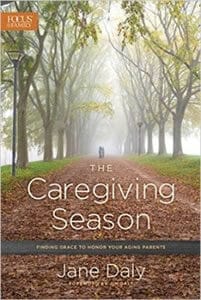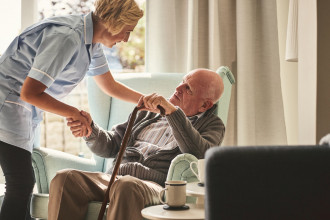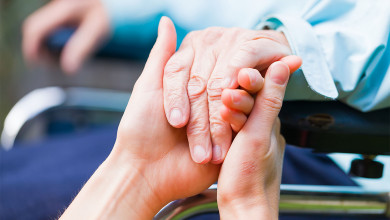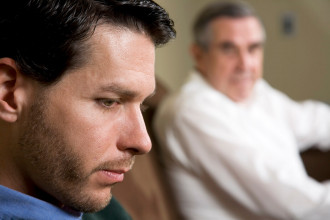Opening:
Excerpt:
Jane Daly: You have guilt all the time. I’m not doing enough, or I’m doing too much, or I’m neglecting my family. I’m neglecting my husband. I’m not concentrating at work, because I’m wondering if mom’s gonna be okay today.
End of Excerpt
John Fuller: Well, caring for an aging loved one, mother or a father, can change your entire perspective on life. This is “Focus on the Family” with Focus president and author, Jim Daly. I’m John Fuller and that’s our topic today. We’re gonna discuss grace-filled caregiving.
Body:
Jim Daly: John, this is such an important topic and I know many of you are living in that spot where you probably have late teens, or adult children, and you’re now seeing your parents age in a way that they’re gonna need more of your time or caregiving. And you’re not sure what to do. And we want to talk about that today with someone who’s written a book. She’s actually my sister-in-law, Jane Daly and I think she and my brother, Mike, have done an outstanding as they have cared for her parents. And she’s written a great book that we will talk about today with her and Jane, welcome to “Focus on the Family.”
Jane Daly: Thank you.
Jim: This is a first, huh?
Jane: Yes. (Laughter)
Jim: Now you said you’re a little nervous. You don’t need to be nervous.
Jane: I’m good, thanks. (Laughter)
Jim: Let’s set it up right there. You go through life. You have your own children. You’re expecting the relationship with your parents to just continue to be what it’s always been. They’re there for wisdom, for advice, for counsel. But then you start seeing things that concern you. What happened in your specific situation? How many years ago was that?
Jane: It was a good six, no, more like seven, eight years ago. You have this idea in your mind that your parents are still the age that they were when you were growing up.
Jim: Right.
Jane: It’s very difficult to see them as anything other than that vibrant, healthy, full of wisdom and fun person. And then slowly these things change, and in our case, it was watching my dad all of a sudden, not be able to drive. (Laughing)
Jim: Yeah, which for you, I mean, your dad was a brilliant person. I mean, a computer genius and—
Jane: Uh-hm.
Jim: –and he just was very accomplished in that area. And to see him all of a sudden not be able to just drive the car. What really specifically happened that caught your attention and Mike’s attention and said, “We got a problem?”
Jane: I was driving home one day and I drive right by my parent’s house and I …
Jim: You’re pretty close to each other.
Jane: Very close, yeah, we just live five houses apart.
Jim: Yeah.
Jane: And I noticed that their side of their garage door was all splintered. And so, I asked my parents, you know, “What happened?” And my mom kind of, you know, kind of humped around. And my dad, of course, refused to answer. And (Laughter) my mom finally—
Jim: It’s a pride thing.
Jane: –yeah (Laughing)—
Jim: Yeah, sure.
Jane: –my mom finally admitted that my dad had run into the side of the garage. And Mike and I both said, “Well, how did that happen?” “Well, dad’s foot slipped off the brake and so, that …” so we kind of laughed it off.
Jim: Right, it could happen.
Jane: Oh, yeah, and I’ve been known to back into things, as well. (Laughter)
Jim: Confession time. (Laughter) How old was he at that point?
Jane: He was 87.
Jim: So, 87 at that point.
Jane: Uh-hm.
Jim: And that’s seven years ago.
Jane: Uh-hm.
Jim: And then what happened next?
Jane: Well, the same thing happened a couple of weeks later, as there was another splintering incident, and we asked my folks about it and of course, my dad refused to answer again. So, my mom took the lead and said, “Well, you know, your dad couldn’t get his foot from the gas to the brake.
Jim: And he hit the back of the garage.
Jane: He hit the side of the garage again.
Jim: Okay.
Jane: So, Mike and I decided we needed to start thinking about having the talk with dad and …
Jim: Let me ask you about that. I mean, just again, you’re … you’re living life, and you have your parents … these are your parents, the people that, you know, as they always say, used to change your diaper.
Jane: Uh-hm.
Jim: And all of a sudden now, you’re noticing they’re struggling. How do you even go into that discussion? I mean, you and Mike talked about it together as a couple. It’s probably fear-filled, right? Your dad is on the edge of those changes, so he’s got pride. He’s not looking forward to telling him you can’t drive anymore. How did you guys calculate that, and then walk into that discussion, and how did your dad respond?
Jane: Well, going back to the feelings, there’s fear on both sides. I was incredibly afraid of having to have that conversation with my dad, knowing that their life would change dramatically.
Jim: Right.
Jane: My dad was the taxi driver for the family, because my mom has macular degeneration and so, she was—
John: So, she can’t drive.
Jane: –she gave up her license a couple of years before. So, my dad and she were very active, and they went out all the time, I constantly saw them drive by the house going somewhere.
Jim: And then you’d say a prayer. (Laughter)
Jane: Exactly.
Jim: But it was that, yeah.
Jane: Right.
Jim: So, they were vibrant and active and …
Jane: Very active and knowing that if we had to take my dad’s car keys, or insist that he not drive, it would be a very large shift in the way that they did life, as well as for Mike and me, you know, what’s that gonna mean for me? Selfishly at that time, it was, how is this going to affect my life? So, there was a lot of prayer and a lot of conversations with my mom–not my dad–about, we really need to have this talk.
Jim: Yeah and when you had it, what was his response?
Jane: Thankfully, his response was very gracious. My father is very logical, so we took him through a logical step. This is what’s going on with you. These are some statistics. This is how other people have refused to give up their license and this is the result.
Jim: So, now you and Mike have to calculate this. That’s where many of our listeners are at right now. They’re engaging their elderly parents at a point where that responsibility’s really gonna land more on them. And you have—
Jane: Right.
Jim: –to start thinking about that. And then you have the Christian overlay of that, to do this with a good attitude, but it’s tough, isn’t it?
Jane: It’s very difficult.
Jim: Why?
Jane: When you get to the point of life where I am and Mike is, I wouldn’t say we’re necessarily selfish, but you’re used to being able to have your own life.
Jim: What does that look like? I mean, when you want to go on vacation, or take a weekend break and … and go get some …
Jane: Well, you pick up and go. You don’t have to think about making arrangements for babysitters, or animal sitters, you know.
Jim: As an empty nester, but now you—
Jane: Yeah.
Jim: –can’t do that, (Someone clearing their throat) because of your parents.
Jane: You have to really plan ahead. How is this going to impact my parents? Are they going to be able to get to a doctor’s appointment? Is there going to be somebody there who can help if they have an emergency. What if they fall down?
Jim: Is it like having children again?
Jane: Yes, it is.
Jim: I mean it sounds like that.
Jane: It is.
Jim: And Jean and I haven’t had to go through that. You know, we lost my parents, as you know—
Jane: Uh-hm.
Jim: — before I was married, and her mom and dad both passed away without that kind of caregiving requirements. And so, we did not have to go through that. You’ve been doing this now for how many years?
Jane: Well, let’s see. My dad passed away six years ago, so it’s been at least seven, possibly eight.
Jim: And your mom is still alive. She’s 92.
Jane: Uh-hm.
Jim: And uh—
Jane: Correct.
Jim: –is legally blind.
Jane: Right.
Jim: So, she can’t get out, so you’re still providing that care. How do you think this has changed your relationship with your mom, as she’s still living?
Jane: It’s very difficult to have the friend relationship. As you grow older, you make friends with your parents, because you’re an adult, and although there’s a certain dynamic where they will always think of themselves as your parent, you can more have a peer-to-peer relationship. This changes the dynamic and totally reverses the roles.
Jim: In fact, with your dad, Roger, you came to a point where it was no longer just the driving was an issue. He was falling frequently. The paramedics were having to come out to the house regularly.
Jane: Uh-hm.
Jim: And you had a pretty tough discussion with one of the paramedics at one point. Describe that for us and talk about how even the state will often engage when resources like that are being used excessively.
Jane: Usually what would happen is, my mom would call. If my dad fell down, my mom would call us. Mike would go down and pick my dad up. My dad’s health declined, and he had severe edema. So, he had gained a lot of weight. Mike was no longer able to pick my father up. So, when he would fall, then my mom would call 911. At one point, and I think it was probably maybe the third time in a month when we dialed 911, the paramedic said, “If you call us again, we will call Social Services.” And basically, they would make the decision about where my father would go, but he would no longer be able to live at home.
John: That’s a pretty startling moment, I would assume.
Jane: It was a huge wake-up call.
Jim: Probably felt like a dead end in terms of an alley you go down and you’re going, how do we get out of this?
Jane: Yeah, what do we do?
Jim: So, what did you do? You didn’t want that to happen. You didn’t want the state to engage and make that decision where Roger would go. But how did you sort that out?
Jane: We remembered that we had spoken with a social worker, who was an expert in caring for elderly. We had her out to the house several times, and she talked to us about some different alternatives. And we discussed it with my mom first, ’cause it’s very difficult, but my dad was just very non-engaged by that point. And so, we talked it over with my mom and decided that a board and care home would be the best place for my father.
Jim: And who had to deliver that message, and how did that [go]?
Jane: Oh, I did—
Jim: Yeah.
Jane: –with Mike and my mom, but my mom, of course, didn’t want to take the lead. So, it was walking through that progression again, as my father’s very logical. So, we had to go through the progression of, “you keep falling. We keep calling 911. They refuse to come out again. Mom can’t take care of you. We can’t take care of you. This is the next step.”
Jim: And how did he receive it?
Jane: He received it as well as he could. It was very difficult for all of us.
Jim: That has to be, when you’re thinking from the perspective of the parent, the elderly parent, that has to be the line where you know that it’s not normal anymore, that it’s not like yesterday—
Jane: Uh-hm.
Jim: –that this is now different. It’s the beginning of the decline—
Jane: Right.
Jim: –especially if you have to take yourself out of your home, say goodbye, in essence, to your spouse.
Jane: There’s a lot of grief on everybody’s part—
Jim: Yeah.
Jane: –not only my mom for giving up her husband, of having him in the same house, my father having to know that he’s probably gonna die someplace else, for me, knowing my father wasn’t gonna hop down to the house and ask for coffee on Saturday morning. It’s—
Jim: Right.
Jane: –it’s … there’s a grieving for everyone.
Jim: Right. In your case, you have another challenge, because your dad had not formally made a commitment to Christ. Your mom did, and you were raised in the church, although your dad didn’t really participate wholeheartedly. Talk about that distinction, caring for an elderly parent, where one is saved and one isn’t, or maybe in some people’s case, like my wife, Jean, neither parent had made a commitment to Christ. That’s a very heavy burden to carry, as you hit that line and you know this is the point of no return. How did you manage that emotionally? How did you feel about that? What did you do to say, “Dad, I mean, come on, we’re nearing the end zone here. We’ve gotta think about spiritual things.”
Jane: My dad was in denial up to the end. When we delivered the news to him that he had about two weeks left to live, and that hospice was going to be coming and caring for him, helping to care for him in the home, he kept insisting that she was going to come and help him get better. And we kept saying, “No, dad, she’s not going to help you get better. You are not going to get better.” It was really difficult, because he just didn’t want to accept the fact that he was dying. And when Mike called me and said, “You need to come right now, because your father is now dying.” We were there. At the very end, I was just … I don’t know if he could hear me, but I was yelling in his ear, “I love you Daddy. I love you Daddy. Please accept Jesus right now. He is waiting for you. He wants to save you. Please accept Jesus Christ. Please confess to Him.” And he couldn’t speak, because he was choking and having trouble breathing ’cause his lungs were filling up with water. But I yelling in his ear. I don’t know.
Jim: I mean, what a dramatic moment.
Jane: It it was—
Jim: That’s—
Jane: –very …
Jim: –life and death. That’s—
Jane: it was.
Jim: –eternal life and death.
Jane: It was.
Jim: Yeah.
Jane: It was … it was very difficult.
Jim: And Jane, the other aspect here that, you know, again for you writing this book and trying to compile thoughts and ideas to help other people do this well, to take care of aging loved ones, parents,within a was it a five-week span? I mean, you lost your son, Bobby, as well, my nephew.
Jane: Uh-hm.
Jim: He died of cancer at the age of 30. Talk about that. I mean, to have that happening in the same amount of time, right in that same space of time, where you’re losing your dad. Your son now is in hospice.
Jane: Uh-hm.
Jim: Talk about that if you can, because that to me was remarkable, as I sat as a family member and simply watched and observed and did what I could, but there was a lot of pressure on you and Mike.
Jane: Yes, the last year of my dad’s life where he declined so much was the year that Bobby was struggling, dealing with the cancer and going into chemotherapy. And when my father passed away, we did a service like two or three weeks later, and it seemed like right after that then, Bobby’s wife called us and said, “You need to come out to Colorado now. Bobby’s dying.” So, I didn’t even have a chance to grieve my father, when now I’m sitting with my son watching him die.
Jim: Well, and your mom’s still at home.
Jane: And my mom is at home—
Jim: Needing—
Jane: –alone.
Jim: –you.
Jane: Yeah, and we just had to leave. We got the call on a Sunday night, and we left Monday morning, and I had to leave my mom and let her deal with the fallout of my father’s death, while we were dealing with our son’s imminent death.
Jim: I mean, it is so rational and so understandable for you to start shaking your fist at God at this moment, in this pit, and say, “Where are You, Lord?” I mean, this is kinda overwhelming. How did you manage spiritually what you were dealing with and where God had you and Mike in that moment?
Jane: God has taken us through many difficult times in our lives. I’ve been a Christian for 39 years,and through those times, you build up that spiritual muscle, and I spent a lot of time dealing with um … just spending time with God. I had the assurance that Bobby was going to heaven, and that gave me great comfort. And so, I was able to let him go. My father was more difficult, because I didn’t know.
John: Well, we’re visiting with Jane Daly on today’s “Focus on the Family.” Your host is Jim Daly. I’m John Fuller and this is a tough one. This is a hard conversation for a lot of us, either because we’re right there or we’re looking ahead, seeing it’s not too long before we have to have that conversation about the car keys with our parents and all that means. It’s a lonely work of service. We have resources here at Focus to give you some encouragement and support. We have caring Christian counselors if you need … need to talk with somebody. We’re a phone call away, 800-A-FAMILY or you’ll find a lot of helps at www.focusonthefamily.com/radio, including Jane’s book, The Caregiving Season. And it’s an excellent resource.
Jim: Jane, let me ask you this. Um … I mean, you have that logic streak in you, as well, like your father.
Jane: Yes. (Laughter)
Jim: It’s not necessarily distant; the fruit didn’t fall from the tree, right?
Jane: Exactly.
Jim: But in Colossians 4:6, it says, “Let your speech always be gracious, seasoned with salt, so that you may know how you ought to answer each person.” Putting that Scripture in the context of caring for your elderly parents, there’s gotta be times where you get frustrated. And you know, the demands are so high. You’ve got so much outside of that going on and then you’re going, “Really, Mom? Really, Dad? I mean, really? You need me to do this? Can this wait a week?” What are some of those things that you identified that are irritants that you have to really, as followers of Christ, you’ve gotta say, “Listen this is right just to absorb this, not to react to it.” But what are some of the irritating things that can happen in this moment that irritated you?
Jane: Would you like a list?
Jim: Yeah. (Laughter) That’d be good, because I think people that are going through it need to know that’s normal. Okay, it’s normal to be irritated about that kind of request.
Jane: Uh-hm.
Jim: What were some of those requests that you were like, “Wow, really.”
Jane: Well, what I have found is that, I’m working full time, and I’m caring for my mom after work. So, I’ve got the demands of work, and I’ve got the demands of Mom, and sometimes those collide, because I come home, I’m tired. And there’s an expectation now, because we’ve been providing meals for my mom for the last six years, that this is going to be provided.
So, when there’s a night where either I’m too tired to cook or it’s raining and I don’t feel like walking down there or I have a[n] after-work thing, I find that my mom may get a little irritated with me, that … “Well, what do you mean, I have to fend for myself?” And so, my reaction could easily be, “Really? (Laughing) Can you just have a piece of toast? Can you find something in your freezer?”
So, instead of reacting in that way, it’s having to say, “You know, I’m sorry. Um, this is what’s going on and you know, I’ll see you tomorrow.” Or if I’m busy a couple of three nights a week, and I don’t get down to see my mom, when I do go down to see her, she gets a little snarky sometimes, like “Oh, I didn’t recognize you.” (Laughter) “What’s your name again?” (Laughter)
Jim: Those things that they can say.
John: Ouch!
Jim: Coming from a mom, those things usually cut pretty deep.
Jane: They do and I know it’s her way of being humorous to say, “Hey, I missed you.” But, it kinda gets my back up, like ugh!
Jim: Right.
Jim: I would think for the adult child trying to do that caregiving, it you have a lot of humanness that comes into that and you begin as you lay your head on the pillow at night, to think of all your shortcomings, because you got snippy with your parent. You didn’t respond. You didn’t bring the meal to them when they expected it. That can load a lot of guilt onto you, as well. How did you manage taking a deep breath and accepting your limitations without being super daughter?
Jane: I tried to be super daughter and hence, a lot of burnout. A lot of caregivers express, I think 80 percent of caregivers express that they feel a tremendous amount of stress.
Jim: Fifty percent clinically depressed.
Jane: Yes—
Jim: That’s a lot of pressure.
Jane: –because you have guilt all the time. I’m not doing enough, or I’m doing too much, or I’m neglecting my family. I’m neglecting my husband. I’m not concentrating at work, because I’m wondering if mom’s gonna be okay today. The thing that I want to stress is, that we were not proactive enough. When our parents start to exhibit these signs of getting older, it’s important to look for resources, to find help and not kind of wade into this ocean like we did, of we don’t even know what we don’t know.
Jim: Right.
Jane: There’s resources and being the logical person that I am, I didn’t even think about that. It was like managing the crisis, from crisis to crisis.
Jim: Well, you talked about the elderly parent being in denial about their physical limitations, but I would assume the adult child trying to now manage it, is also in





















